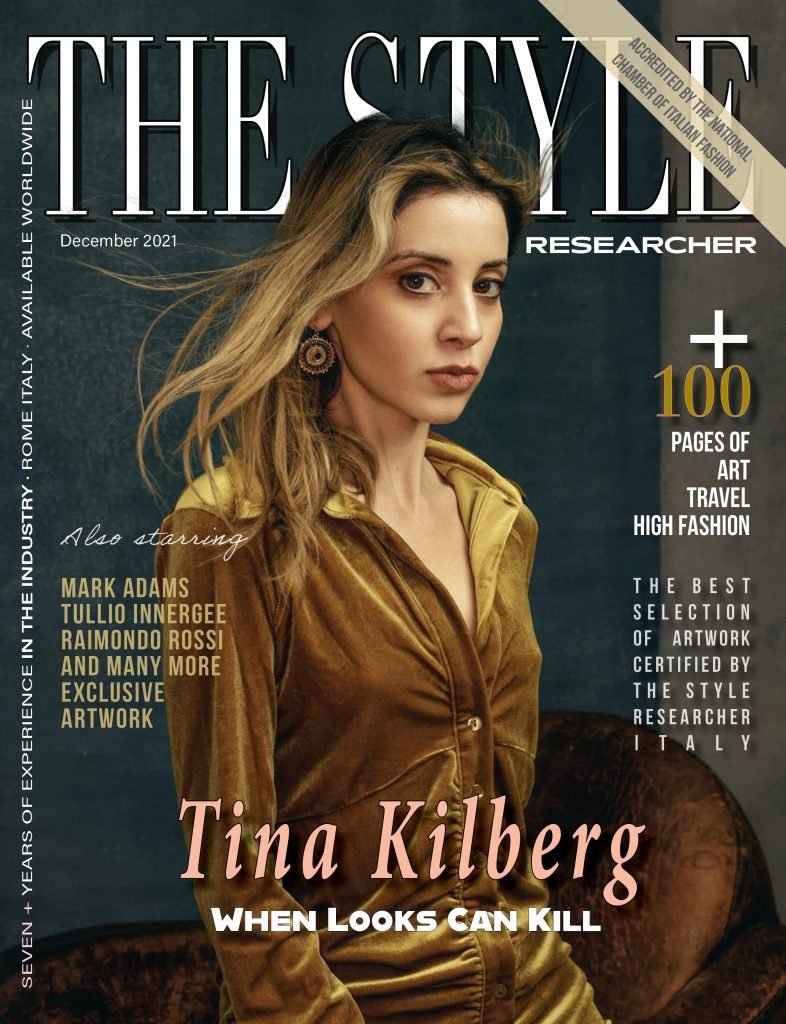TINA KILBERG

This month Tina Kilberg graced our cover. We had the pleasure to interview her and talk about everything from acting to the whole world beyond it. The editorial features beautiful photos of the actress shot by Ivan Weiss.

Hello Tina and welcome to The Style Researcher. We love you and your style. As someone who previously mediated between Vancouver and LA, you’ve decided to migrate to Europe for some time. Do you think actors can experience success beyond Hollywood and the West Coast?
Hello guys. Thank you. It is a pleasure talking with you. Every actor goes through phases in their career and needs to take some lessons - this is my time to learn about the process of auditioning and working on TV. It’s not something I see myself doing forever - as I do want to get back into films and digital series at some point - but it’s definitely a stepping stone for now. I wouldn’t encourage my younger self to move to LA to become an actor - it only leads to disappointment if you’re getting started. LA only makes room for established talent.

Would youever see yourself moving to LA on a full-time basis in the future?
I sure hope so. I remember my last flight from LA to Vancouver so vividly. It’s very hard for me to accept that I’ve left LA, mainly because I can shut my eyes and remember every street, corner, billboard and face in East Hollywood. My current life is a phase where I’ve taken time needed to myself. It is only my return to Hollywood where I’ll feel alive again - I’m only hoping I’ll be a stronger version of myself that can overcome the strange and dangerous valleys of Hollyweird.
What’s themajor difference you’ve noticed between actors in LA and actors in Greece?
Actors in LA are always working 2-3 jobs so they can save up money for headshots - Greek actors either have none, or go for the old school b&w type. Although both cities are built upon nepotism and networks, the way actors approach the industry between LA and Greece is incredibly different. You would’ve thought that you were observing two entirely different fields of entertainment, if not time periods!

What’s anideal quality you look for in collaborators?
Anyone who’s versatile. Film work is a very hands-on job, which is why over-planning can be very inefficient. For this reason, I’m drawn to people who encompass a sense of confidence in the unknown. They seem to already have a sense of knowing that things will turn out great - that’s such an attractive quality to have, it’s something I’ve been developing myself over the last 3 years.
Is theresomething you personally struggle with in acting?
A major obstacle of mine is having to neglect everything I learned about the film industry in Vancouver and LA, which includes technical aspects of acting. Greek directors tend to encourage actors to deliver their lines very fast, which was something I was discouraged to do for years, dating back to my training. I’m still a believer that an actor needs to walk through a particular pace and take their time with line delivery. The biggest struggle, in this situation, is to trust the directors regardless and do what they ask.

- Do youever worry about not delivering a good performance?
I was only worried about my performance during the early years, whether I was training or working on independent film works. I no longer concern myself with my performance if I’m working on a large production. If I made it to final cut, then somebody in the decision-making process decided it was good enough to air on TV.
How do you feel about watching yourself perform?
I have a habit of always muting my scenes. Given that most of the scenes that get sent to me are already edited professionally, I never have to worry about the sound quality. I can only watch my scenes - as well as auditions - on mute, as this is the only accurate way for me to assess the acting.
Has working on TV established a greater sense of stability for you as an actor?
Not entirely. I made my first appearance on Cypriot television back in November 2020, but still struggle to seek work despite my contacts. Gaining access to networks and circles doesn’t guarantee a position for you into a TV Series. This was the biggest lesson I learned working on TV, mainly because I’ve made a large number of contacts, yet only a few appearances.

What other major challenges have you faced as a TV actor?
Financial challenges mostly. I’ve had to deal with productions that would get out of their way to avoid their financial obligations by postponing payments. A particular production went for as long as 4 months to avoid paying actors alongside myself. It’s essential for actors to recognise the value they add to production and use any vetoing powers when necessary to ensure payment.
What’s your advice to other actors, who are trying to establish themselves in the entertainment industry?
To create a life for yourself outside of acting, whether that’s hobbies, social relationships or a second job. It’s important to remember that, on average, actors are working 3-6 months if not 9 months throughout the year. There will be times where you could be inactive for as long as 3 months. The acting profession can bring a lot of pain to an actor who is not being valued or hired by industry professionals, which is why it’s important to find happiness beyond this profession. As hard as it may be for some of us to accept, acting is not everything; there is a whole world beyond it.
Thanks a lot Tina. It has been a pleasure to get to know you better. Our biggest congratulations on your professionalism and charm, both as a person and as an actress.
Thank you guys. It has been a pleasure for me too.

Actor: Tina Kilberg
IG: tinakilberg
WB: www.tinakilberg.com
Photographer: Ivan Weiss
IG: ivanweiss.london
FB: https://www.facebook.com/ivanweiss.london/
WB: http://ivanweiss.london
TW: https://twitter.com/IvanWeissLondon
To see more go to the Homepage and pick your favorite section.

